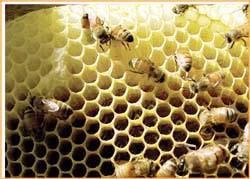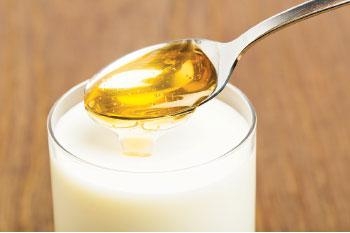தேன், நினைத்தாலே இனிக்கும் இயற்கையின் அற்புதம். தேனை விரும்பாதவர்கள் குறைவு. கெட்டுப்போகாத ஒரே உணவுப் பொருள் என்றால் அது தேன் மட்டும்தான். பழங்காலம் தொட்டே மருந்திலும், விருந்திலும் தவறாமல் இடம்பெற்றிருந்த தேனில் கலப்படம் என்பதும் ஹைதர்காலத்து பழைய சமாச்சாரம்தான். இன்றைய வர்த்தகமயமான சூழலில் வளர்ப்புத் தேனீக்கள் மூலம் கிடைக்கும் தேன் பெருகிவிட்டது. கூடவே கலப்படமும் இவற்றில் நிறையவே நடப்பதாகக் கூறப்படுகின்றது. இவை கண்ணாடி பாட்டில்களில் அடைக்கப்பட்டு வண்ணமயமான ஸ்டிக்கர்களுடன் கணஜோராக காட்சியளிக்கின்றன. கிட்டத்தட்ட எல்லா பாட்டில்களின் லேபிளின் மீதும் 'ஒரிஜுனல் நேச்சுரல் ஹனி' என்றே குறிப்பிடப்பட்டிருக்கின்றது. சூப்பர்மார்க்கெட்களில் அடுக்கி வைக்கப்பட்டிருக்கும் இந்தத் தேனின் பளபளப்பான நிறம் நம் அனைவரின் கண்களையும் ஈர்க்கவே செய்கின்றது. ஆனால், எளிதில் கலப்படம் செய்யக்கூடிய பொருட்களில் முதலிடம் வகிப்பது தேன்தான்.

வணிக நோக்கத்துக்காக சில நிறுவனங்கள் தேனில் வெள்ளை சர்க்கரையைக் கலந்து விற்பனை செய்து வருகின்றன. தங்களது வியாபாரத்தைப் பெருக்க, இந்திய உணவுத் தரக் கட்டுப்பாட்டு அமைப்பு விதித்திருக்கும் கட்டுப்பாடுகளை தனியார் நிறுவனங்கள் சாமர்த்தியமாக மீறுவதை வாடிக்கையாகக் கொண்டிருக்கின்றன. இதுபோன்ற கலப்படங்களின் விளைவாக தேனுக்கான மகத்துவமும், மருத்துவ குணமும் இல்லாமல் போகிறது. மேலும் தேனில் மற்ற சில கலப்படங்களும் நடக்கின்றன. இந்தக் கலப்படங்களைக் கண்டறிவது எப்படி, நல்ல தேனை எப்படிக் கண்டுப்பிடிப்பது போன்ற விஷயங்களை அனைவரும் அறிந்து கொள்ளவேண்டும்.
* ஒரு சிறு கிண்ணத்தில் தண்ணீரை நிரப்பி, அதில் ஒரு சொட்டுத்தேனை விடவும். தண்ணீரில் அது கரைந்தால், அது கலப்படம் செய்யப்பட்டது. கரைந்து போகாமல் நேராக பாத்திரத்தின் கீழே சென்று தங்கினால், அது சுத்தமான தேன்.

* சுத்தமான காட்டன் துணியை தேனில் நனைத்து, அதை எரியும் தீக்குச்சியில் காண்பித்தால், நன்றாக சுடர்விட்டு பற்றி எரியும். அப்படி எரிந்தால் அது சுத்தமானது.
* சிறிதளவு தேனை எடுத்து வாணலியில் சூடு செய்தால், அதன் அடர்த்தி குறைந்து, உருகிவிடும். பின்னர் அடுப்பை அணைத்து விடவேண்டும். சுத்தமானதாக இருந்தால், சில மணி நேரங்களானதும், பழைய அடர்த்தியை அடைந்துவிடும். கலப்படம் செய்யப்பட்டதாக இருந்தால், இழந்த அடர்த்தியைத் திரும்பப் பெறாது.

* தேனை கண்ணாடி ஜாரில் ஊற்றி, சில மணிநேரம் வைத்திருக்க வேண்டும். சுத்தமான தேனாக இருந்தால், அடர்த்தி ஒரே சீராக இருப்பதுடன், நிழல் போன்ற அடுக்குப் படலம் ஏற்படாது. தேனின் நிறம் ஒரே சீராக இருக்கும். கலப்படம் செய்த தேனின் அடர்த்தி மாறுபடும்.
* சுத்தமான தேனுக்கு அடர்த்தி அதிகம். அதை ஸ்பூனில் எடுத்து கிண்ணத்தில் விட்டால், மெல்லிய நூல் இழை போல் இறங்கும். கலப்படம் செய்யப்பட்ட தேன், சொட்டு சொட்டாக வடியும்.

சுத்தமான தேனை ஒரு பாத்திரத்தில் இருந்து மற்றொரு பாத்திரத்துக்கு மாற்றினால், அதன் அடர்த்தி காரணமாக உடனே ஒட்டாமல் குமிழ் போல பரவி, பாத்திரத்தின் வடிவத்துக்கு ஏற்ப தேன் சம நிலை பெற சிறிது நேரம் எடுத்துக்கொள்ளும். கலப்படம் மிகுந்த தேனை பாத்திரத்தில் ஊற்றினால், உடனேயே தண்ணீர் போல பாத்திரத்தில் சமநிலையில் இருக்கும்.






